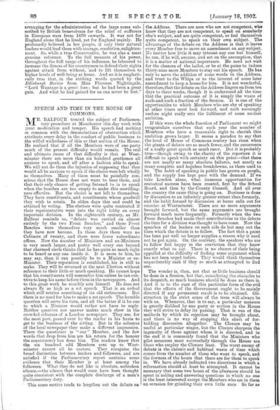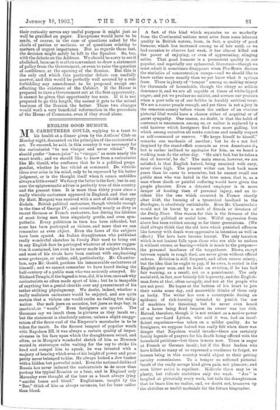SPEECH AND TIME IN THE HOUSE OF COMMONS.
MR. BALFOITR treated the subject of Parliamen- tary procedure at Manchester this day week with great moderation and temper. His speech had nothing in common with the denunciations of obstruction which attribute every delay in the conduct of public business to the wilful wickedness of this or that section of the House. He realised that if all the Members were of one party much of the present difficulty would remain. The real and ultimate cause of that difficulty is that at West- minster there are more than six hundred gentlemen all anxious to speak, and all after a fashion able to speak. We will not do them the injustice of supposing that they would all be anxious to speak if the choice were left wholly to themselves. Many of them must be painfully con- scious that the House _does not want to hear them, and that their only chance of getting listened to is to speak when the benches are too empty to make this unwilling- ness effective. But the choice is not left to themselves. They have constituents, and constituents whose goodwill they wish to retain. In olden days this end could be attained, by voting. The electors were quite contented if their representative went into the right lobby on every important division. In the eighteenth century, as Mr. Balfour reminds us, "debate was carried on almost entirely by the two Front Benches," and these Front Benches Were themselves very much smaller than they have now become. In those days there were no Cabinets of twenty, and there were fewer subordinate offices. Now the number of Ministers and ex-Ministers is very much larger, and pretty well every one beyond that charmed circle thinks that he has quite as much right to be heard as any one inside it. It is more to him, he may say, ,than it can possibly be to a Minister or ex- Minister. Their reputation is established, his is still to make. They will be returned at the next Election without reference to their little or, much speaking. He cannot hope that his Constituents will remember him unless he can con- trive to keep his name before them in the newspapers. And to this great work he steadily, sets himself. He does not wa alys fly as high as a set speech. That is an ordeal which still retains something of its old seriousness. But there is no need for him to make a, set speech. The humble question will serve his turn, and all the better if it be one to which a Minister Would rather not have to reply. Neither question nor answer makes much show in the crowded cdlumns of a London newspaper. They are, for the most part, passed over by the reader in his haste to get to the business 'of the sitting. But in the columns of the local.newspaper they make a different impression. There' the questioner is " our " Member, and the few words that drop from him are his return for the honour the constituency has done him. The readers know that the six hundred odd Members seat up to West- minster cannot all be orators. They recognise the broad distinction between leaders and followers, and are satisfied if the Parliamentary report contains some evidence that their Member is at least among the -followers. What they do not like is absolute, unbroken Silence,—the silence that would -once have been thought quite consistent with the -complete discharge of a mat's Parliamen tary duty.
.* This same 'naive tends to lengthen 'out the debate on the Address. There are men who are not competent, who know that they are not competent, to speak on somebody else's subject, and, are quite competent, or feel themselves quite' competent, to speak on their own subject. The advantage of the debate on the Address is that it leaves every Member free to move an amendment on any subject. No matter how little it may interest any one but himself, he can, if.he.will, assume, and act on the assumption, that it is a matter of national importance. He need not wait for the chances of the ballot, or be at the pains to induce thirty-nine more Members to stay out his speech. He has only to move the addition of some words to the Address, and trust to the Whips or to the interest of some later amendment to keep a house for him. It is not wonderful, therefore, that the debate on the Address lingers on from ten days to three weeks, though it is understood all the time that the practical outcome of it is simply the waste of such-and-such a fraction of the Session. It is one of the opportunities to which Members who are shy of speaking at other times most look forward, and each seemingly useless night really sees the fulfilment of some modest ambition.
If this were the whole function of Parliament we might congratulate ourselves that each year the number of Members who have a reasonable right to cherish this ambition grows larger. It seems a paradox to say that the level of House of Commons oratory has risen when the giants of debate are so much fewer, and the occurrence of a really great speech so much rarer. But it is probably true—though owing to the charity of the reporters it is difficult to speak with certainty on this point—that there are not nearly so many absolute failures, not nearly so many complete and hopeless breakdowns, as there used to be. The habit of speaking in public has grown on people; and the supply has kept pace with the demand. If we take London alone, what immense opportunities for oratorical success have been created, first by the School Board, and then by the County Council. And all over the country the same thing is going on. Business is done by discussion to an infinitely greater extent than formerly, and the habit formed by discussion at home calls out for exercise at Westminster. There are no more arguments brought forward, but the same arguments are brought forward much more frequently. Formerly when the two Front Benches had made their contributions to the debate the time for a, division was thought to have come. Now the speeches of the leaders on each side do but map out the lines which the debate is to follow. The fact that a point has been put well no longer supplies a reason why it need not be put again. On the contrary, the speakers who are to follow feel happy in the conviction that they know exactly what to say. There is no chance of their being appalled at the difficulty of finding some argument which has not been urged before. They would think themselves unpardonably rash if they so much as attempted to find. one.
The wonder is, then, not that so little business should be done in a Session, but that, considering the obstacles to its despatch, so much business should, be done as there is. And it is to the cure of this particular form of the evil that the efforts of the Government ought to be mainly directed if any permanent result is to be obtained. Ob- struction in the .strict sense of the term will always be with us. Whenever, that is to say, a particular measure is greatly disliked by one party or section in the House they will strive to delay its passing. That is one of the methods by which its rejection may be brought about, and there is no way of stopping this short of for- bidding 'discussion altogether. The Closure may be useful at particular stages, but the Closure sharpens the ingenuity of those against whom it is directed, and in the end it is commonly found that the Ministers who pilot measures most successfully through the House are those who employ the Closure least. The worst enemy of debate in the chronic and habitual waste of time which comes from the number of those who want to speak, and. the fewness of the hours that there are for them to speak in. We have already indicated two directions in which a reformation should at least be attempted. It cannot be necessary that some two hours of the afternoon should be spent in asking and answering questions in which no one is the least interested except the Members who see in them an occasion for grinding their own little axes. So far as their curiosity serves any useful purpose it might just as well be gratified on paper. Exceptions would have to be made, of course, in the case of questions asked by the Chiefs of parties or sections, or of questions relating to matters of urgent importance. But as regards these last, the decision might safely be left to the Speaker. So, too, with the debate on the Address. We should be sorry to see it abolished, because it is often convenient to draw a statement of policy from the Government, or even to raise the question of corifidence, at the opening of the "Session. But this is the only end which this particular debate can usefully answer; and this would be perfectly well secured by a rule forbidding any amendment to be proposed except one affecting the existence of the Cabinet. - If the House is prepared to turn a Government out at the first opportunity, it cannot be given that opportunity too soon. If it is not prepared to go this length, the sooner it gets to the actual business of the Session the better. These two changes would work- a very beneficial reformation in the procedure of the House of Commons, even if they stood alone.







































 Previous page
Previous page